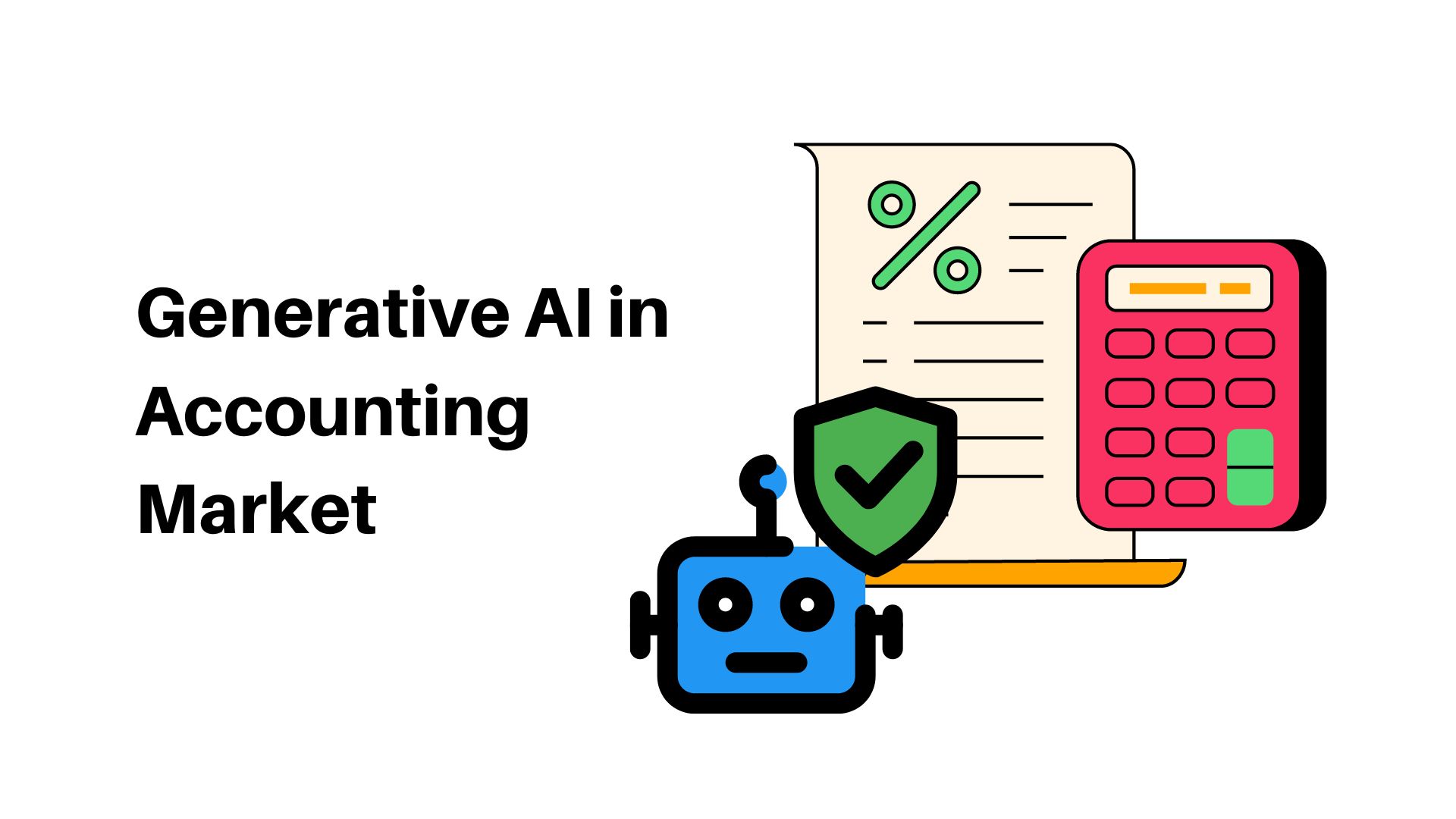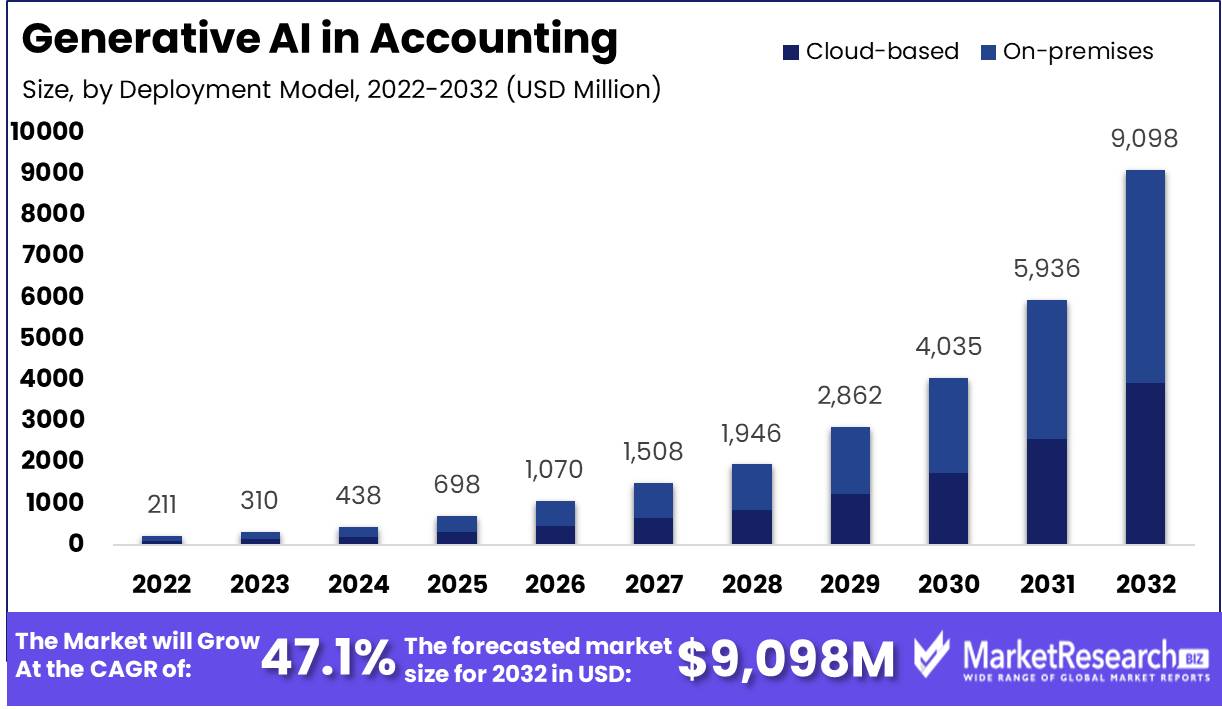Global Generative AI in Accounting Market Set for Rapid Growth, To Reach Around USD 9,098 Mn by 2032

Page Contents
Market Overview
Published Via 11Press : Generative AI in Accounting Market size is expected to reach USD 9,098 Mn by 2032, up from its current value of USD 211 Mn in 2022, growing at an annual compound growth rate (CAGR) of 47.1% from 2023-2032.
Generative AI, an emerging subset of artificial intelligence, has made significant strides across a number of fields – accounting being no exception. Accounting professionals are increasingly adopting this technology to streamline and automate processes while increasing accuracy and decision-making capacities.
Generative AI in accounting refers to the use of machine learning algorithms to generate synthetic or generated data that mimics real-life accounting scenarios. These algorithms analyze large datasets, recognize patterns and relationships within them, then create new data based on these discoveries. Generative AI could potentially revolutionize accounting tasks while freeing accountants up for more strategic and analytical considerations when performing them.
Generative AI's key application in accounting is creating financial statements. After training its AI model with vast amounts of historical financial data, this method can generate accurate and reliable statements much more efficiently than an accountant would, reducing manual effort while decreasing errors or inconsistencies.
Generative AI has proven its worth in fraud detection. By analyzing past transaction data and detecting anomalies, AI algorithms are helping accountants proactively investigate and prevent financial fraud and save organizations from potential financial losses.
Generative AI also aids organizations with forecasting and budgeting. By analyzing historical financial data, market trends, and other pertinent factors, AI models can generate accurate forecasts for future financial performance allowing organizations to make informed decisions and develop effective financial strategies.
Key Takeaways
- Streamlining Processes: Generative AI technology automates repetitive accounting tasks like data entry, invoice processing and reconciliations – streamlining processes while decreasing manual errors and increasing efficiency.
- Financial Statement Generating Algorithms: AI algorithms trained on historical financial data can produce accurate, reliable financial statements much quicker than human accountants – saving both time and effort while decreasing errors or inconsistencies.
- Fraud Detection: Generative AI provides an efficient method for fraud detection by analyzing transactional data and detecting anomalies or patterns that indicate potential fraudulent behavior. This proactive approach allows accountants to mitigate financial losses by investigating and addressing fraud immediately.
- Forecasting and Budgeting: AI models analyze historical financial data and market trends to provide accurate predictions and forecasts of future financial performance, which enable organizations to make informed decisions and develop efficient financial strategies.
- Intelligent Automation: Leveraging OCR and NLP technologies, generative AI automates tasks such as data extraction from invoices, automated data entry and transaction reconciliations – freeing accountants up for more strategic and analytical work.
Request Sample Copy of Generative AI in Accounting Market Report at: https://marketresearch.biz/report/generative-ai-in-accounting-market/request-sample/

Regional Snapshot
- North America: North American regions such as the US and Canada have been at the forefront of adopting artificial intelligence into accounting. Major accounting firms and organizations throughout this region have made substantial investments in AI-powered accounting solutions with the purpose of automating repetitive tasks, improving accuracy and increasing decision making capabilities.
- European Countries: Like North American nations, European nations have also accepted and implemented AI technologies into accounting practice at a relatively slower pace compared to North America. European Union regulations and data protection laws have had an influence over adoption and implementation decisions made regarding AI technologies; nonetheless countries like United Kingdom, Germany and France have made significant strides in adopting and integrating generative AI into accounting practices.
- Asia-Pacific: Countries like China, Japan, India and Australia in this region have seen exponential growth in AI adoption for accounting purposes. Businesses including multinational corporations as well as startups are driving demand for AI accounting solutions while governments in this region have taken measures to foster AI adoption by providing an environment suitable for its expansion.
- Latin America: Although generative AI for accounting remains relatively nascent in Latin America, interest is increasing in using this technology for accounting processes. Countries like Brazil and Mexico are seeing greater investments into AI infrastructure and research facilities – likely driving its widespread implementation into accounting processes in coming years.
Any inquiry, Speak to our expert at: https://marketresearch.biz/report/generative-ai-in-accounting-market/#inquiry
Drivers
- Efficiency and Cost Savings: Generative AI automates manual and repetitive accounting processes, cutting the time and effort spent on them in half and freeing accountants up for more strategic, analytical work. As a result, its use can increase both efficiency and cost savings for accounting processes.
- Improved Accuracy and Reliability: AI algorithms trained on large datasets can produce accurate and reliable financial statements, forecasts, and predictions that reduce errors and inconsistencies while improving accounting information quality overall.
- Fraud Detection and Prevention: Generative AI supports proactive fraud detection by detecting anomalies or patterns indicative of fraudulent behavior, helping accountants detect and prevent financial fraud, thus saving organizations from potential financial losses.
- Regulatory Compliance: Generative AI assists the accounting industry with adhering to various regulations and reporting standards, automating processes and producing financial statements that comply with regulatory guidelines.
- Growing Data Volumes: With organizations producing more financial data each year, traditional manual methods for processing and analyzing are becoming less feasible. Generative AI provides a faster and more accurate way of extracting valuable insights quickly while supporting informed decision-making processes.
- Technological Advancements: Technological innovations like computing power, cloud infrastructure and machine learning algorithms have made generative AI more accessible and efficient, speeding its adoption into accounting. AI tools and platforms have further expedited its uptake.
- Competitive Advantage: Organizations that utilize generative AI accounting gain a competitive edge by harnessing technology to streamline their financial processes. Their ability to generate accurate financial statements, create informed forecasts, and detect fraud more efficiently places them ahead of their peers.
Restraints
- Data Quality and Availability: Generative AI models depend heavily on large datasets for training. Unfortunately, accessing high-quality, comprehensive accounting data may prove challenging at times; inaccurate or incomplete accounting data could result in biased or unreliable AI models that could compromise training results.
- Ethical and Legal Considerations: Generative AI raises ethical concerns when used to generate synthetic financial data, including privacy issues, data protection regulations and potential misuse. As with any technology, its use must also take into account legal considerations.
- Interpretability and Explainability: Generative AI models can be complex and difficult to interpret, making understanding the rationale behind generated results or decisions a challenge, especially in financial statements or forecasts. Lack of interpretability could prevent trust from developing and adoption may reduce adoption in accounting tasks requiring critical AI assistance.
- Expertise and Training: Implementing generative AI accounting requires expertise in both AI technologies and domain knowledge of accounting, so organizations may encounter difficulty recruiting or upskilling employees with these capabilities to build, deploy, and maintain AI models.
Opportunities
- Enhanced Decision-Making: Generative AI provides accountants and financial professionals with valuable insights and predictions, helping them make more data-driven decisions and ultimately enhance financial strategies and outcomes.
- Advanced Fraud Detection: Generative AI has the potential to significantly enhance fraud detection capabilities by detecting complex patterns and anomalies within financial data, helping organizations proactively prevent and detect fraudulent activities, thus minimizing financial losses.
- Automation and Efficiency: Generative AI simplifies accounting processes while increasing efficiency while freeing accountants up for more strategic activities. By automating repetitive tasks such as data entry, invoice processing, and reconciliation generative AI can streamline accounting procedures and free accountants up for more strategic pursuits.
- Financial Statement Generation: Generative AI allows businesses to produce accurate and reliable financial statements quickly while eliminating manual effort and potential errors – which allows for faster reporting and analysis.
- Compliance and Audit Support: Generative AI can aid regulatory compliance by automating processes and producing accurate financial reports that adhere to accounting standards. Furthermore, Generative AI provides support for audit procedures by providing detailed data analysis and documentation services.
Take a look at the PDF sample of this report: https://marketresearch.biz/report/generative-ai-in-accounting-market/request-sample/
Challenges
- Trust and Reliability: Trust is of utmost importance in accounting, and AI-generated results may cause concern over accuracy and reliability. Establishing it by guaranteeing transparency and quality assurance within AI models presents a great challenge to accountants.
- Regulation Environment: The accounting industry is subject to stringent regulations and standards, making implementation of generative AI systems while adhering to these regulations an intricate task that demands in-depth knowledge and compliance with legal requirements.
- Security and Privacy: Handling financial data involves sensitive information, and its use raises security and privacy issues. Organizations should implement necessary precautions to safeguard this sensitive financial data.
- Integrating Generative AI Solutions Into Existing Systems: Integrating Generative AI solutions with existing accounting systems and workflows may prove to be difficult, with compatibility issues, data migration needs and system updates possibly creating hurdles during implementation.
- Cost and Return on Investment: Implementing generative AI accounting technology requires an investment in infrastructure, training and maintenance. Before undertaking such initiatives, organizations should assess both their cost-effectiveness and long-term return on investment before proceeding.
Market Segmentation
Based on Deployment Model
- Cloud Deployment
- On-Premises Deployment
Based on Technology
- Deep Learning Technology
- Natural Language Processing Technology
- Machine Learning Technology
- Other Technologies
Based on Application
- Data Entry and Processing
- Fraud Detection and Risk Assessment
- Financial Forecasting and Analysis
- Compliance and Audit Support
- Decision Support and Optimization
- Other Applications
Based on End-User
- Large Enterprises
- Small and Medium Enterprises
- Accounting Firms
- Other End-Users
Key Players
- IBM Corporation
- KPMG
- BlackLine, Inc
- SAP SE
- Workday, Inc.
- NVIDIA Corporation
- Intuit Inc.
- UiPath Inc.
- Deloitte Touche Tohmatsu Limited
- Other Key Players
Report Scope
| Report Attribute | Details |
| Market size value in 2022 | USD 211 Mn |
| Revenue forecast by 2032 | USD 9,098 Mn |
| Growth Rate | CAGR Of 47.1% |
| Regions Covered | North America, Europe, Asia Pacific, Latin America, and Middle East & Africa, and Rest of the World |
| Historical Years | 2017-2022 |
| Base Year | 2022 |
| Estimated Year | 2023 |
| Short-Term Projection Year | 2028 |
| Long-Term Projected Year | 2032 |
Recent Developments
- 2021: In January, Microsoft announced that they had acquired accounting automation startup Botley, using artificial intelligence (AI) technology to automate tasks such as data entry, reconciliation and reporting.
- 2022: In February, Intuit unveiled QuickBooks AI – an AI feature of its accounting software that uses generative AI to assist businesses with tasks such as budgeting, forecasting, and tax preparation.
- 2023: Sage announced its acquisition of accounting automation startup Receipt Bank in March. Using artificial intelligence technology, Receipt Bank automatically extracts data from invoices and receipts that can then be used to update accounting records.
Key Questions
1. How can generative AI improve fraud detection in accounting?
A: Generative AI can significantly enhance fraud detection by analyzing large volumes of financial data, identifying anomalies, and detecting patterns indicative of fraudulent behavior. This proactive approach allows accountants to detect, investigate, and prevent fraud with reduced financial losses.
2. What are the potential ethical concerns of using generative AI in accounting?
A: Ethical concerns related to using generative AI models for accounting purposes include protecting sensitive financial data used for training these models as well as guaranteeing fairness, transparency, and accountability within AI decision-making algorithms.
3. How can generative AI assist with financial forecasting and budgeting?
A: Generative AI models analyze historical financial data, market trends, and other pertinent factors in order to produce accurate predictions and forecasts of future financial performance allowing organizations to make informed decisions and create successful financial strategies.
4. What are the obstacles of implementing generative AI in accounting?
A: Implementation challenges associated with generative AI include data quality and availability issues, ethical/legal considerations, interpretability of AI models and needing expertise both in AI and accounting domains. Integrating it with existing systems as well as meeting regulations are also major hurdles.
5. What advances have taken place recently in accounting-related generative AI?
A: Recent developments include advances in AI models, increased emphasis on explainable AI to improve interpretability, exploration of blockchain integration for enhanced security purposes and development of industry-specific apps tailored specifically to accounting needs in various sectors.
Contact us
Contact Person: Mr. Lawrence John
Marketresearch.Biz (Powered By Prudour Pvt. Ltd.)
Tel: +1 (347) 796-4335
Send Email: [email protected]
Content has been published via 11press. for more details please contact at [email protected]
The team behind market.us, marketresearch.biz, market.biz and more. Our purpose is to keep our customers ahead of the game with regard to the markets. They may fluctuate up or down, but we will help you to stay ahead of the curve in these market fluctuations. Our consistent growth and ability to deliver in-depth analyses and market insight has engaged genuine market players. They have faith in us to offer the data and information they require to make balanced and decisive marketing decisions.



